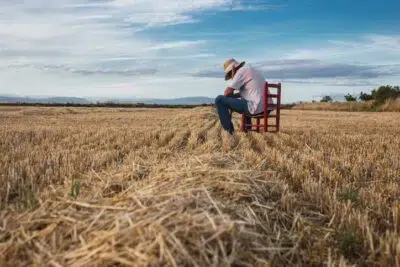A most disturbing report by Reuters describes shortages of essential farm chemicals as “off the charts.” This is in part a forced, unnecessary tragedy and it is worldwide.
Reuters interviewed more than a dozen chemical dealers, manufacturers, farmers, and weed specialists.
Shawn Inman, the owner of distributor Spinner Ag Incorporated in Zionsville, Indiana, said supplies are the tightest in his 24-year career.

EVERYTHING IS WRONG
“This is off the charts,” Inman said. “Everything was delayed, delayed, delayed.”
Farmers can’t fight weeds, especially with glyphosate, an ingredient in RoundUp after its overuse in the United States.
One farmer talked about EPA over-regulation as a problem.
Some farmers might reduce planting or not plant at all.
If the US is in trouble, it is worse for the rest of the world. We are facing a devastating food shortage that the WEF – Schwab revolutionaries – will undoubtedly blame on traditional capitalism.
The sanctions play no small part in this disaster.
If you can’t read the Reuters article about the shocking and troubling issues, go to MSN quoting Reuters, or read here at the end.
THE TRAGEDY TO COME
These chemicals, and fertilizers, ultimately are dependent on the petrochemical industry which the current regime froze and partially shut down as soon as figurehead Biden took over.
Currently, we haven’t felt the impact of these shortages because we are still living off the last harvest. The problems will really begin in August or September. All of the problems are exacerbated by team Biden’s collapsing of the petroleum industry.
Animal farmers and ranchers are dependent on grain feed to get their herds through the winter. If there is not enough food for people, there will not be enough for animal feed. Herds will be culled, and meat will be cheaper for a short time. Then it will be very, very expensive. It takes years to rebuild herds.
The enemies within live mostly in the urban areas and they are clueless. They won’t be when the problems hit. They will blame everyone but who is to blame and they will become violent.
This is what Klaus Schwab has suggested will be necessary for The Great Reset. No one is stopping this because it is probably deliberate and well-planned. The planners aren’t stupid. They’re evil.
THE KEY POINTS OF THE REUTERS ARTICLE
Tennessee farmer Jason Birdsong said he abandoned plans to plant soybeans on 100 acres after waiting months to receive Liberty he ordered from Nutrien Ag Solutions. He ultimately received less than half his order for 125 gallons and planted corn on the land instead. Birdsong said he is better able to control weeds in corn than soybeans.
Nutrien (NTR.TO) said numerous events stalled the supply chain during the pandemic and the company provided alternate solutions to customers.
Birdsong said he needed Liberty to fight weeds that are resistant to glyphosate in soy fields. He said he ruled out a third option, a dicamba-based herbicide from Bayer, because of extensive federal restrictions on when and where dicamba can be sprayed.
“With the dicamba technology being so strict, Liberty is the go-to,” Birdsong said.
The Environmental Protection Agency approved new restrictions on dicamba use this year in Iowa and Minnesota, two major farm states.
On the other hand, the US government has approved half a billion dollars for wheat farmers to help with grain shortages that have resulted from Russia’s attack on Ukraine. However, this expenditure may not mitigate all the challenges currently being faced.
Kansas wheat farmer Clay Schemm, who also serves as the President of the Wallace County Farm Bureau, joined “Morning in America” to discuss the obstacles farmers are working to overcome.
“Predominantly in our state, especially in the southwest areas, we’ve had extremely hot and dry temperatures. And with the wind just coming through and really increasing the loss of moisture, we’ve been seeing a lot of struggle to get the yield production that we would see on a typical year,” Schemm said.
A heat dome over the country has sent temperatures skyrocketing, drying out farmland and making it harder for farmers to produce crops.
“But trying to keep up with it when the yields aren’t there just makes for a struggle. I know farmers are doing their best to respond to this food shortage, but with the lifecycle of wheat, it’s hard for a lot of people to respond, and turnaround on a dime and change up those cropping practices,” Schemm said.
If American farmers are hurting, then the rest of the world will follow. The situation is so concerning that U.N. Secretary-General Antonio Guterres warned that the world faces a “catastrophe” because of the growing food shortage across the globe.
“There is a real risk that multiple famines will be declared in 2022,” he said in a video message to officials from dozens of rich and developing countries gathered in Berlin. “And 2023 could be even worse.”
Guterres noted that harvests across Asia, Africa, and the Americas will take a hit as farmers around the world struggle to cope with rising fertilizer and energy prices.
“This year´s food access issues could become next year´s global food shortage,” he said. “No country will be immune to the social and economic repercussions of such a catastrophe.”
Hopefully, valuable lessons about shortening supply chains and strengthening domestic production will be learned and implemented before real food scarcity slams us.


